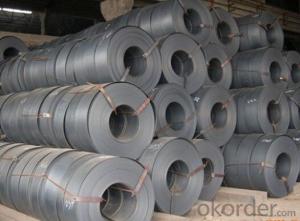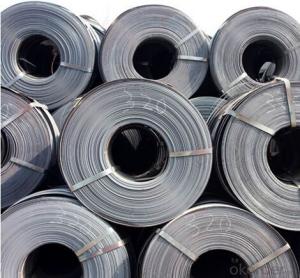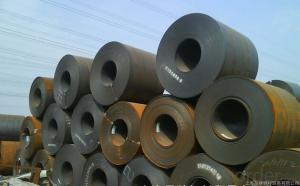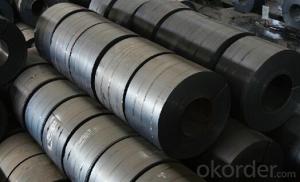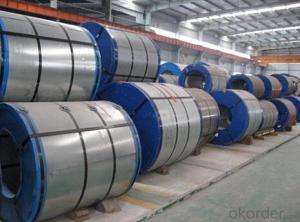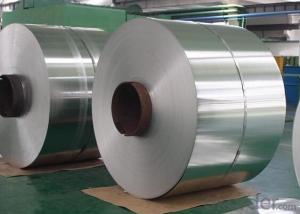Grade Q345 HR Steel Coil with High Quality and Low Price
- Loading Port:
- Tianjin
- Payment Terms:
- TT OR LC
- Min Order Qty:
- 25 m.t.
- Supply Capability:
- 10000 m.t./month
OKorder Service Pledge
OKorder Financial Service
You Might Also Like
Item specifice
Grade Q345 HR Steel Coil with High Quality and Low Price
Quick Details
Name | Hot Rolled Steel Coil |
Standard | GB/ASTM/SAE/AISI/DIN/JIS/EN/BS |
Surface Treatment: | Black/Peeling/Polished/Machined |
Delivery Condition: | Hot Rolled or Forged/Peeled or Black Surface |
Test | SGS/UT 100% Elements Testing |
Certificate: | ISO/Mill Certificate |
Service: | 24 hours online service / |
more than 20 years trading and manufacture | |
Quality Assurance: | the third party inspection, such as SGS, BV, TUV…etc. is acceptable |
Packaging Details: | Seaworthy Packaging or as per customer's packing instruction |
Specification
Commodity | Hot rolled steel plate/Mild steel plate/black steel plate/Carbon steel plate/sheet |
STEEL GRADE | A36, AH36,A283 Gr.C, SS400, S235J1/S235J2/S235JR, S275J1/S275J2/S275JR, A516 Gr.60/A516 Gr.70, ST37-2 |
Standard | GB,JIS,DIN,AISI,ASTM |
Thickness | 1.5mm ~ 200mm |
Width | 1000mm 1220mm 1250mm 1500mm 2000mm 2500mm 3000mm |
length | below 12000mm & coil |
Surface | Clean, blasting and painting according to customer requirement |
Delivery time | standard size 15days goods can load into container, if produce goods need 35days |
Application | Widely used in petrochemistry,chemistry,electricity,boiler and vessel manufacture,and could |
be made into reactor,heat exchange facility,segregator,sphere vessel,oil tank,liquid gas storage | |
tank,nuclear reactor press shell,turbine and other machines | |
Shipping | length below 5.8m with 20' container, length below 11.8m with 40' container. or Bulk shipping. |
Company Information
CNBM International Corporation is the most import and export platform of CNBM group(China National Building Material Group Corporation) ,which is a state-owned enterprise, ranked in 270th of Fortune Global 500 in 2015.
With its advantages, CNBM International are mainly concentrate on Cement, Glass, Iron and Steel, Ceramics industries and devotes herself for supplying high quality series of refractories as well as technical consultancies and logistics solution.
After-sale service | l CNBM provides the services and support you need for every step of our cooperation. We’re the business partners you can trust; you can relax and get on with doing business. |
l For any problem, please kindly contact us at any your convenient time, we’ll reply you in our first priority within 24 hours | |
Advantages | Industry experience over 20 years. |
Shipment of goods -More than 70 countries worldwide. | |
The most convenient transport and prompt delivery. | |
Competitive price with best service. | |
High technical production line with top quality products. | |
High reputation based on best quality products. |
Product Show
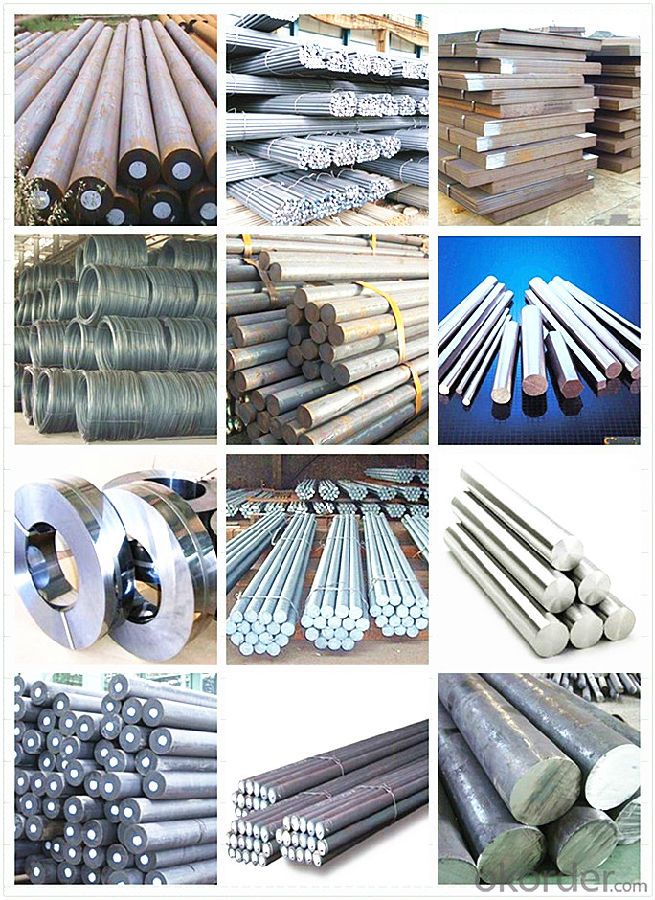
FAQ
Are you a trading company or manufacturer? | Manufacturer |
What’s the MOQ? | 3 metric ton |
What’s your delivery time? | 15-35 days after downpayment received |
Do you Accept OEM service? | Yes |
what’s your delivery terms? | FOB/CFR/CIF |
What's the Payment Terms? | 30% as deposit,70% before shipment by T/T |
Western Union acceptable for small amount. | |
L/C acceptable for large amount. | |
Scrow ,Paybal,Alipay are also ok | |
Why choose us? | Chose happens because of quality, then price, We can give you both. |
Additionally, we can also offer professional products inquiry, products knowledge train (for agents), smooth goods delivery, excellent customer solution proposals. | |
What's your available port of Shipment? | Main Port, China |
What’s your featured services? | Our service formula: good quality+ good price+ good service=customer's trust |
Where are your Market? | Covering more than 160 countries in the world |
- Q:What are the challenges in heat treatment of special steel?
- Some challenges in the heat treatment of special steel include achieving the desired hardness and strength without compromising other properties, such as toughness and corrosion resistance. Special steels often have complex compositions, which can make it difficult to accurately control the heat treatment process. Additionally, heat treatment of special steel can be time-consuming and costly due to the need for precise temperature and time control, as well as the potential for distortion or cracking during the heat treatment process.
- Q:What are the different galvanizing techniques used for special steel?
- There are several galvanizing techniques used for special steel, each with its own advantages and considerations. Some common techniques include hot-dip galvanizing, electro-galvanizing, and mechanical galvanizing. Hot-dip galvanizing involves immersing the steel in a bath of molten zinc, creating a thick, durable coating. Electro-galvanizing uses an electric current to deposit a thin layer of zinc onto the steel surface. Mechanical galvanizing, also known as centrifuge galvanizing, uses centrifugal force to apply a zinc coating. Each technique has its own specific applications and benefits, depending on factors such as the desired thickness of the coating, the complexity of the steel structure, and the intended use of the galvanized steel.
- Q:What are the different food processing grades of special steel?
- There are several different food processing grades of special steel that are commonly used in the food industry. These grades are specifically designed to meet the strict requirements of food processing, ensuring the safety and quality of the products. One of the most commonly used food processing grades of special steel is AISI 304 stainless steel. This grade is known for its excellent corrosion resistance, making it suitable for use in environments where food is being processed. It is also highly resistant to chemicals and acids, further enhancing its suitability for food processing applications. Another grade frequently utilized in the food industry is AISI 316 stainless steel. This grade offers even better corrosion resistance than AISI 304 and is often used in applications where the equipment comes into direct contact with food or food-related substances. AISI 316 stainless steel is also resistant to high temperatures, making it suitable for use in heat-intensive food processing operations. Additionally, there are food processing grades of special steel that are specifically designed for use in environments with high hygiene requirements. These grades, such as AISI 316L and 1.4404, have a smoother surface finish, which helps to prevent the buildup of bacteria and facilitate easier cleaning. Overall, the different food processing grades of special steel offer various levels of corrosion resistance, temperature resistance, and hygiene properties. These qualities ensure that the steel used in food processing equipment is durable, safe, and meets the strict standards of the industry.
- Q:Can special steel be used in the packaging industry?
- Yes, special steel can be used in the packaging industry. Special steel, such as stainless steel or high-strength steel, offers excellent durability, corrosion resistance, and strength properties. These characteristics make it suitable for manufacturing various packaging materials and equipment, including containers, drums, cans, and machinery. Additionally, special steel's versatility allows for customization and adaptation to meet specific packaging requirements, making it a preferred choice in the industry.
- Q:What are the future trends in special steel manufacturing?
- The future trends in special steel manufacturing are likely to focus on advancements in technology, sustainability, and the development of new alloys. Firstly, technology will play a significant role in shaping the future of special steel manufacturing. Automation and robotics are expected to be increasingly integrated into the production process, leading to improved efficiency, precision, and reduced labor costs. This will also allow for better quality control and the ability to produce more complex and customized steel products. Secondly, sustainability will be a key focus in special steel manufacturing. As the world becomes more environmentally conscious, companies are seeking ways to reduce their carbon footprint. This includes employing cleaner production methods, such as using renewable energy sources and implementing recycling programs to minimize waste. Additionally, there will likely be a shift towards developing greener alloys with reduced environmental impact. Furthermore, the development of new alloys will be crucial in meeting the evolving needs of various industries. With advancements in material science, special steel manufacturers will be able to create alloys with enhanced properties, such as increased strength, durability, corrosion resistance, and heat resistance. These new alloys will cater to the growing demand for high-performance materials in sectors like aerospace, automotive, energy, and construction. Moreover, the future of special steel manufacturing is also likely to be influenced by the increasing demand for lightweight materials. As industries strive to improve fuel efficiency and reduce emissions, there will be a need for special steel alloys that offer high strength-to-weight ratios. This will drive research and development efforts towards creating lighter yet stronger steel products. In conclusion, the future trends in special steel manufacturing will revolve around technological advancements, sustainability, and the development of new alloys. These trends will shape the industry, bringing about increased automation, cleaner production methods, and the creation of innovative alloys to meet the changing needs of various sectors.
- Q:What are the main advantages of using special steel in the construction of bridges?
- The main advantages of using special steel in the construction of bridges are its high strength, durability, and resistance to corrosion. Special steel, such as high-strength low-alloy steel or weathering steel, can withstand heavy loads and extreme weather conditions, making it ideal for bridge construction. Its superior strength allows for the design of lighter and more cost-effective structures. Additionally, special steel's resistance to corrosion reduces maintenance and repair costs, ensuring the longevity and safety of the bridge.
- Q:What are the main applications of special steel in the power distribution industry?
- The main applications of special steel in the power distribution industry include the manufacturing of power transmission towers, transformers, and various high voltage equipment. Special steel is used due to its excellent strength, durability, and resistance to corrosion, which are crucial qualities for ensuring the reliability and efficiency of power distribution systems.
- Q:What are the main applications of special steel in the food processing machinery?
- Special steel is commonly used in various applications in food processing machinery due to its unique properties. One of the main applications is in the production of cutting blades and knives, where special steel's high hardness and excellent wear resistance ensure efficient and precise cutting of food products. Additionally, special steel is utilized in the manufacture of components like shafts, gears, and bearings, thanks to its exceptional strength, corrosion resistance, and ability to withstand extreme temperatures. These properties make special steel ideal for ensuring the durability, hygiene, and safety of food processing machinery, ultimately contributing to the efficient production of high-quality food products.
- Q:What are the common challenges in heat treating titanium alloys?
- There are various difficulties encountered when heat treating titanium alloys. One of the primary obstacles arises from titanium's strong tendency to react with oxygen, nitrogen, and hydrogen at elevated temperatures. This reactivity can lead to contamination on the surface and the creation of unwanted oxides, nitrides, or hydrides, which can adversely affect the mechanical characteristics of the alloy. Another challenge involves the development of alpha-case, a thick layer of alpha-phase titanium that forms on the alloy's surface during the heating process. This alpha-case is brittle and can significantly diminish the material's fatigue strength and ductility. Consequently, it is crucial to minimize or eliminate the formation of alpha-case during titanium alloy heat treatment. Moreover, titanium alloys have a limited temperature range for effective heat treatment. If the temperature is too low, the desired microstructure and mechanical properties may not be achieved. Conversely, if the temperature is too high, grain growth can occur, resulting in reduced strength and toughness of the alloy. Furthermore, precise control over the heating and cooling rates is often required when heat treating titanium alloys to achieve the desired microstructure and properties. Inadequate or uneven cooling can lead to non-uniform microstructures, residual stresses, or distortion of the component. Finally, the cost of heat treating titanium alloys can pose a challenge. Titanium alloys have a high affinity for oxygen, necessitating the use of specialized equipment such as vacuum furnaces or controlled atmosphere furnaces to maintain a low oxygen environment. These specialized heat treatment processes can be costly and demand careful handling and maintenance to ensure the desired outcomes. To summarize, the common challenges encountered in heat treating titanium alloys include managing reactivity with oxygen, nitrogen, and hydrogen, minimizing alpha-case formation, achieving the appropriate temperature range, controlling heating and cooling rates, and dealing with the expenses associated with specialized equipment and processes. Overcoming these challenges is essential to obtain high-quality titanium alloy components with the desired properties.
- Q:What are the different testing methods used for special steel?
- Some of the common testing methods used for special steel include hardness testing, tensile testing, impact testing, metallographic examination, chemical analysis, and non-destructive testing. These methods help assess the mechanical properties, microstructure, chemical composition, and overall integrity of special steel, ensuring its suitability for various applications.
1. Manufacturer Overview |
|
|---|---|
| Location | |
| Year Established | |
| Annual Output Value | |
| Main Markets | |
| Company Certifications | |
2. Manufacturer Certificates |
|
|---|---|
| a) Certification Name | |
| Range | |
| Reference | |
| Validity Period | |
3. Manufacturer Capability |
|
|---|---|
| a)Trade Capacity | |
| Nearest Port | |
| Export Percentage | |
| No.of Employees in Trade Department | |
| Language Spoken: | |
| b)Factory Information | |
| Factory Size: | |
| No. of Production Lines | |
| Contract Manufacturing | |
| Product Price Range | |
Send your message to us
Grade Q345 HR Steel Coil with High Quality and Low Price
- Loading Port:
- Tianjin
- Payment Terms:
- TT OR LC
- Min Order Qty:
- 25 m.t.
- Supply Capability:
- 10000 m.t./month
OKorder Service Pledge
OKorder Financial Service
Similar products
New products
Hot products
Related keywords
